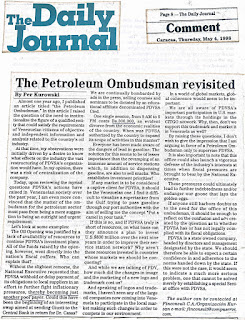Once again we read that PDVSA has been given instructions to purchase goods and services it requires to operate from sources outside national borders, limiting thereby local purchases. The reason for this policy is purported to be the fight against inflationary pressures. Although we have continuously heard declarations issued by Government sources to this effect, the official petroleum sector vehemently denies it.
Evidently, it did not take long for local suppliers of goods and services to raise the roof with severe criticism. The latter is obviously based on the outright injustice brought on them and the local economy by an evident preference given foreign suppliers. The brief observations that follow address other aspects of this initiative.
Above all, it is important to note that there is no direct link between local purchases and inflation, specially in the case of PDVSA. Should the oil industry purchase goods locally instead of importing them, the State always has the option of selling hard currency against Bolívares, thereby soaking up the possible excess liquidity caused by these transactions. By the way, in order not to be disqualified from the roster of possible suppliers of services to the oil industry, I am willing to invoice any services they could possibly require in US$ and from the location they prefer. The only thing left for me then is to make my peace with the tax man.
Evidently, it is necessary to import should PDVSA’s demand of local goods and services eventually result in such strain on supplies that prices go through the roof. In this case, imports would not be the result of the application of economic policy (hare-brained or not) but of a simple and usual business common sense that dictates that you buy where it is least expensive.
These observations bring us around to the real question about the real scope of the oil industry’s operative independence or, if we look at the other side of the coin, the scope of the direct influence exerted by the National Executive on PDVSA and its operations.
If it is true that the Government has the power to instruct PDVSA to direct it’s purchases towards one source or another, when to pay its bills, etc., etc., without being subjected to legal norms and regulations such as the Law of Safeguarding of Public Patrimony (Ley de Salvaguarda del Patrimonio Público) and running circles around the Central Bank’s independence without so much as a polite salute, then I’m afraid we are in the presence of a parallel government of some import.
I am not a public servant, but I feel that should I be one and be appointed to sit on the Finance Committee of Congress, I would definitely consider my job belittled. Should I be called on to collaborate with the development of the national budget, which is evidently based on the use of a few small printed bills, it is possible that the game of Monopoly would have immediately come to mind. In addition, I would surely be intensely jealous of those who, being directly in charge of budgeting the use of real resources such as PDVSA’s, have much more to say in the future of our country.
By saying this, I am not inferring that Congress should be the entity in charge of PDVSA’s budget. A democracy is based on the existence of a system of checks and balances. Therefore, if the National Executive, with or without reason, insists on intervening directly in the oil industry’s activities, it is clear that it is necessary to regulate the limits of this interference.
A few months ago for similar ends, I suggested the creation of the figure of the “Oil Ombudsman”. Initially this was aimed at simply informing the common citizen, objectively and truthfully, about the state of the national oil industry. In Swedish, the word “Ombudsman” means something like the spokesman and representative of public interest. It is a figure used in many countries in areas that are infinitely less important than the oil industry is to Venezuela.
Today, we are all trying to evaluate the consequences of the recent reorganization of PDVSA and would all like to clear up the issue of the instructions supposedly issued as far as PDVSA’s purchases are concerned. We all must feel the need to go talk to someone credible who could clearly answer our questions about matters related to the efficiency of the industry as well as about possible consequences of Government intervention in the same. If accusations of intervention are false, would it not be comforting to hear this from a neutral source as well?
It is probable that neither the National Executive nor the petroleum industry is keen about the possibility of having an external observer hanging around the halls. However, due to the all-important nature of the oil industry for Venezuela as a whole, it is our responsibility to request the existence of one.






